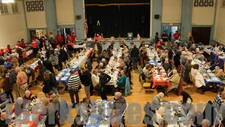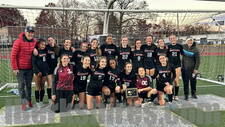Meet The B-HIPs: Maki Fujita and Valeria FedericiBy Jen Thomas
06:00AM / Friday, June 22, 2007
 | | Maki Fujita is working at two internships as part of the B-HIP program.[Photo by Jen Thomas] |
The Massachusetts College of Liberal Arts Berkshire Hills Internship program, known as B-HIP, drew 13 college and graduate student interns from around the globe to its summer session of the arts-based Berkshire region internship program. www.iberkshires.com invites our readers to "Meet the B-HIPs" and discover what the program and our region offers to those with a love of the arts.
North Adams - For Berkshire Hills Internship Program interns Maki Fujita and Valeria Federici, the cultural resources in Berkshire County present but a sampling of the American artist community.

Valeria Federici on being in the U.S.: "The main challenge is to be open-minded." [Photo by Jen Thomas] |
As two international students in the B-HIP program, working in the art world in a foreign country poses unique challenges.
Maki Fujita
A student at the State University of New York at Fredonia, Maki Fujita, 35, moved to the United States from Japan about a year ago to pursue a career in arts administration.
"In Japan, I used to do the same things always and I need some stimulation," said Fujita. "Here, I have the chance to meet new people and have the opportunity to see real arts scenes."
Working at two internships - one at Skyboro Sound Recording Studio in North Adams and one at KadmusArts in Bennington. Vt. - Fujita said she wants to use the lessons she learns this summer to better the arts situation in Japan.
"I want to change the Japanese art world," said Fujita, who ultimately wants to run her own theater management projects. "I know many talented artists [in Japan], but it's difficult for them to get a job or make themselves noticed. There are no people who have skills in arts management, no people to organize art."
"I want to learn the skills and bring the know-how to Japan," she said.
Formerly working as a music teacher in her hometown, Fujita said that Japan lacks any sense of the importance of art.
"I strongly feel the importance of art in education," she said. "Most colleges don't offer theater or arts management courses; it is very difficult for Japan. Japanese society's problem is that it is very materialistic, I feel. Somehow, music and art are not important; it is just a hobby."
Fujita said that, in her experience, the Japanese respect "high education and going to a good college" all in pursuit of what Fujita said is regarded as vital - money.
"I have money, though, and I am not happy. I feel I cannot feel real happiness without art," said Fujita.
At Skyboro Sound and KadmusArts, Fujita's primary responsibilities include working on computers, updating websites and databases, but she wants more from her internship.
"I thought 'I'm studying in college but I need more practical experience,' and I want to work in the U.S. before going back to Japan, but I really want to learn more and be more interactive. It's so frustrating, very challenging, to not speak better English and to always work on computers," she said.
B-HIP provides Fujita with an opportunity to strengthen her skills in fundraising and grant writing for the art world, but her career plans are more focused on dealing directly with artists.
"I want to engage in a collaboration in music and theater," said Fujita. "I want to be like a mediator between Japan and America - like a bridge. I want to introduce Japanese arts and artists to the world."
Valeria Federici
Graduating from Università degli Studi Roma Tre (The Third University of Rome) in 2003, Valeria Federici knew she wanted to be either in the arts management or curatorial field. The Rome native also knew she wanted to eventually reside in an English-speaking country, so the B-HIP program afforded her the perfect opportunity to get the experiences she needed.
"I'm really lucky. When you pick a program from really far away, you won't know what you get until you're here," said Federici, 30.
Working at the Massachusetts College of Liberal Arts' Gallery 51, Federici said she's enjoying being immersed in an arts management curriculum.
"I'm enjoying this small city, the small arts community," she said. "I hope to get a strong experience in the art gallery world. I [would] like to know how they pick out works of art, how they decide what to show, how they design the calendar for the year."
Federici said part of the appeal of working in the United States is the well-developed market for contemporary art.
"The contemporary art field is well-developed in the English market. Almost all of the museums and galleries are located in New York City or London," she said.
Federici said there are small contemporary arts movements across Europe, she named Venice and Germany as examples, but England or the United States provide the best opportunities for getting jobs in the curatorial field.
As part of B-HIP, Federici works primarily as the assistant to Sean Riley, the manager of the gallery space on Main Street. She is using this summer as an introduction to the world of arts management and she said the cultural attractions in the Berkshires make her internship even more enjoyable.
"Everything I've seen until now has been beautiful," she said. "I understand that I'm not on holiday so eventually I would like to enjoy everything. I could plan in future a week of events."
Moving to North Adams from Barcelona, Federici said the Berkshires is a whole new experience for her.
"I didn't know this part of the U.S. and I wasn't expecting so many cultural resources. I'm really impressed," she said. "My normal environment is a city, but I appreciate as well an environment that is not stressful and still not slow. It's a balance."
Federici said she wants to spend a few more years abroad either in the U.S. or England, but she eventually would like to reside in London. Hoping to live and work in an English-speaking country, Federici said she has some obstacles to overcome.
"The main challenge is to be open-minded. I have to realize that I am in a different country with people who grew up with a different language and culture. You need to find a balance between your culture's feelings and points of view and theirs," she said.
Federici, who speaks Italian, English and Spanish, said the language barrier is an entirely different problem.
"In Italian, I really enjoy making jokes with words and sentences. I'm really ironic and sarcastic, and it's so frustrating not being able to translate those into English. It's beautiful when you can communicate with many people."
For Federici, language isn't vital to understanding art.
"It's about the intellectual side behind the art," she said. "That's my favorite part of the job."
Jen Thomas may be reached via e-mail at jthomas@iberkshires.com or at 413-663-3384 ext. 23. |




















